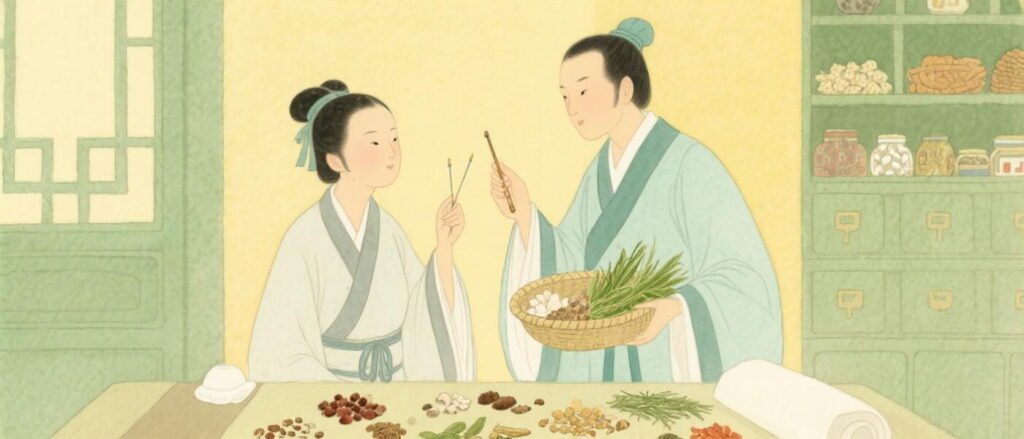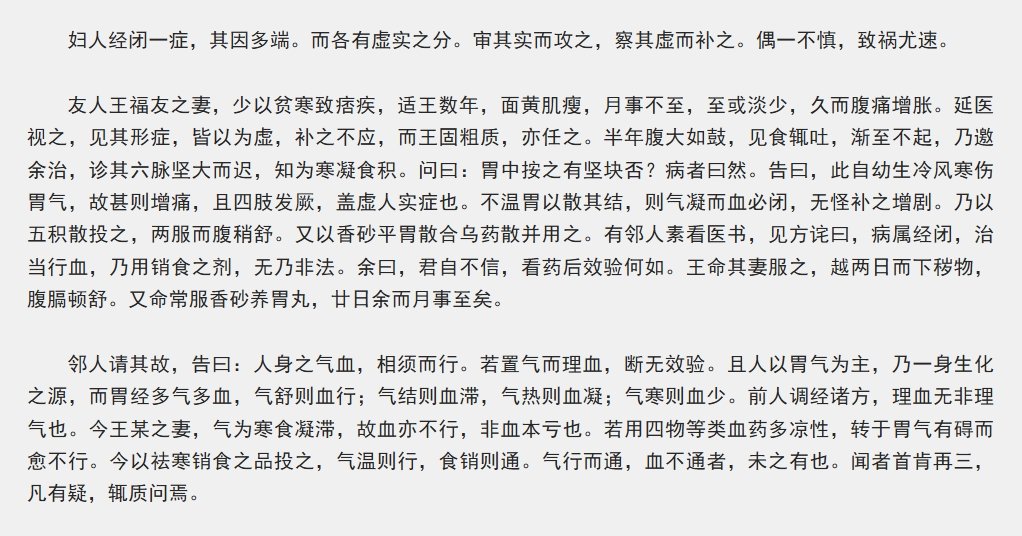On Menstrual Cessation in Women
Menstrual cessation (amenorrhea) can stem from various causes, each categorized as either “deficiency” (weakness) or “excess” (blockage). Correct diagnosis is critical: excess conditions require unblocking, while deficiency requires nourishment. Misdiagnosis can lead to severe consequences.

Case Study: Ms. Wang
My friend Wang Fuyou’s wife developed chronic digestive issues in childhood due to poverty and frequent consumption of cold foods. After years of marriage, she became emaciated with a sallow complexion. Her menstrual cycle stopped entirely or became scant, accompanied by worsening abdominal pain and bloating. Previous doctors diagnosed “deficiency” and prescribed tonics, but these worsened her condition. Her husband, a practical man, initially accepted this (used in traditional contexts).
After six months, her abdomen swelled like a drum, she vomited at the sight of food, and became bedridden. Upon examination, her pulse was strong, large, but slow—indicating cold stagnation and food accumulation. I asked, “Do you feel a hard mass in your stomach?” She confirmed.
Diagnosis:
Her condition originated from childhood exposure to cold foods and environmental cold, damaging her digestive system. Though appearing weak, her body was actually blocked by excess. Warming the stomach and resolving stagnation were essential. Previous tonics had exacerbated the blockage.
Treatment:
- Five Accumulations Powder (Wuji San)
Effect: Dispels cold and dissolves stagnation.
After two doses, her abdominal distension eased. - Costus and Amomum Stomach-Regulating Powder (Xiangsha Pingwei San) combined with Lindera Root Powder (Wuyao San)
Effect: Regulates digestion and warms the middle energizer (digestive system).
A neighbor (who read medical texts) questioned: “Shouldn’t menstrual issues be treated with blood-activating herbs? Why use digestion-focused formulas?” I replied, “Let the results speak.”
Outcome:
Within two days, she expelled foul waste, relieving abdominal pressure. She then took Costus and Amomum Stomach-Nourishing Pill (Xiangsha Yangwei Wan) daily. After 20 days, her menstrual cycle resumed.
Explanation:
The human body relies on the interplay of Qi (vital energy) and Blood. Focusing solely on Blood without addressing Qi is ineffective. The stomach—the body’s “nutrition factory”—governs Qi and Blood circulation:
- Flowing Qi → Blood circulates.
- Stagnant Qi → Blood stagnates.
- Overheated Qi → Blood congeals.
- Cold Qi → Blood diminishes.
Ms. Wang’s Case:
Cold foods and environmental cold had congealed her Qi, blocking Blood flow—not due to inherent Blood deficiency. Using blood-nourishing formulas like Four Substances Decoction (Siwu Tang) (cooling herbs) would have further chilled her stomach. Instead:
- Warming herbs melted cold stagnation.
- Digestive herbs cleared blockages.
Once Qi flowed freely, Blood naturally followed—proving that resolving Qi stagnation restores Blood circulation. The neighbor, convinced by the results, later sought advice for medical questions.

Key Terms:
- Five Accumulations Powder (Wuji San): Classical formula for cold stagnation.
- Costus and Amomum (Xiangsha): Refers to Saussurea costus ( Muxiang) and Amomum villosum (Sharen)—herbs for regulating digestion.
- Lindera Root (Wuyao): Lindera aggregata, warms the middle energizer.
- Four Substances Decoction (Siwu Tang): A blood-nourishing formula with cooling properties.


Leave a Reply